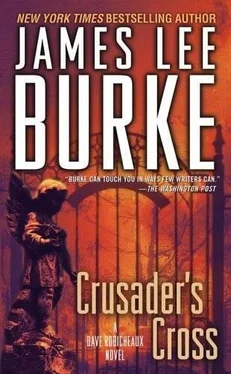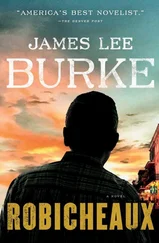"My name is Ida. I left Post Office Street, Lou."
"Like it or not, we're in the life, hon. Folks like us ain't got yesterdays. Forget that Robicheaux kid."
He held a bent spoon over the candle. Inside the curl of flame around the spoon she could see a yellowish-brown liquid boiling, like the broth that rises to the top of chicken soup. The syringe was fashioned from an eyedropper; the tourniquet was a necktie.
"I don't want it," she said.
"We got to do what those Vice roaches say. We're little people, Connie… excuse me… Ida."
"I don't want no dope, Lou."
"Those guys will be gone by tomorrow night. Just go with it. Don't do anything else to get us in trouble. Now give me your arm."
Her elbow jerked slightly when the needle punched into an artery. For a brief moment the room was still, the lightning frozen inside the clouds, then she saw the headlight on a train engine wobbling in front of her eyes and felt a warm rush through her body that was like a long-delayed orgasm.
Her head lolled on the pillow, her mouth open. Even though her eyes were closed, she could see Lou Kale through the lids, which somehow had become translucent, as thin as Japanese paper. She had never felt this warm inside her skin before, this content and serene. Lou put away his works and stroked her forehead.
"I'll come by later and give you another one," he said.
"Get in bed with me."
"That's the dope talking, Ida."
"No, I want you."
"I guess it goes with the job," he said.
He propped the chair under the doorknob and made love to her, at first mechanically,. then he found himself caught up in it, looking at her eyes and mouth and the sandy red color of her hair in a new way. When he got off her, he was self-conscious about his nakedness, confused about what he had just done or why he felt affected by it.
"Be nice to that cop," he said, dressing with his back to her. "I'm jammed up on this deal, too."
"Don't leave, Lou. I'm afraid of them."
"It wasn't really me you wanted, was it? You got me mixed up with that warm feeling the dope gave you."
"I always said you weren't a bad guy, Lou. You never made the girls do anything they didn't want to. You never hit nobody, either. Remember when you told me I could sing as good as Texas Ruby?"
He pulled on his trousers and walked back and forth in front of the window, pushing at his temple with the heel of his hand. "I ain't suppose to be having these kind of thoughts. I'm breaking a big rule here," he said.
"You already said it – 'We're little people.' We have to be smarter than they are."
"Cobb can have me on Sugarland Farm in twenty-four hours. Why didn't you stay up in Snerdville where you belong? You're a king-size migraine, Ida," he said.
"Is that what you really think of me?"
"I don't know what I think. You messed with my head."
He lay down beside her. She curled against him, placing her face against his chest. A moment passed and she felt the tension go out of his body. He exhaled loudly and slipped his arms around her back and tucked her head under his cheek.
"I'll get us out of this," he said.
"I know you will, Lou."
"But you got to promise me something."
She spread her fingers over his heart and waited.
"There ain't no turning back. They'll pour gasoline on you and set you afire. I seen them do it. Say 'promise,' Ida. Say it now," he said.
Before Lou left that night, Ida heard him lie to the detectives and tell them he had injected her a second time. He also told them she'd had a seizure from the heroin and that she should not be bothered again, at least until the next day. During the night she heard the voices of several men who were playing cards and drinking. Once, somebody opened the bedroom door, blading her face with a band of white light. The figure stared at her, motionless, in silhouette, his upper body and head like a buffalo's. Then someone called him back to the poker game and he shut the door.
In the morning she waited until the men were finished with the bathroom, then took fresh clothes from her suitcase and cleaned a gray film out of the tub with a wad of toilet paper. The men had used up the hot tank, so she bathed in cold water and washed her hair with a cake of harsh soap.
She fixed breakfast for herself in a tiny kitchen, her hair wrapped in a towel, while outside the cop named Bordelon and a teenage boy played pitch-and-catch with a baseball. In the distance she could see carrion birds turning in circles over a flooded woods and a powerboat splitting a bay in half. The breeze was up and a salty, gray odor from the sawgrass struck her face and made her shut the window, even though the house was already warm.
Her mandolin was in her suitcase, wrapped inside a soft flannel shirt from which she had removed all the buttons so they could not scratch the mandolin's finish. She sat on the edge of the bed and tuned the strings, using a plectrum and a small pitch pipe, then sang Kitty Wells's "It Wasn't God Who Made Honky-Tonk Angels" in B flat.
The maudlin lyrics and the melody that was borrowed from a hymn titled "The Great Speckled Bird" gave an emotional focus to her life that she intuitively knew was illegitimate but somehow indispensable. The lost lover was Jimmie Robicheaux. Beer joints and back-street bars became blue-collar purgatories where angels with impaired wings could float above a fire that purged but did not consume. The incremental dismemberment of their lives with alcohol, drugs, and lust was a form of penance that ultimately made them acceptable in the eyes of God.
"You play that pretty good," Dale Bordelon said from the doorway. He was sweaty and hot from throwing the baseball in the yard, and she could smell an odor on him like sour milk and hay when it's wet. "That's my nephew out yonder. We're going fishing directly."
She looked out the window at the boy, as though the detective's words held meaning for both of them.
"He's going to town to get us some bait and such. That leaves just you and me," he said.
Her left hand formed a cord on the mandolin's neck, but she didn't move the plectrum across the strings.
"Want me to bring you a cup of coffee or tea?" he asked.
"No, thank you," she replied.
"You're a prissy thing."
His words were spoken in such a way that they could have contained either an insult or a compliment. But she let no reaction to them register in her face.
"When's Lou coming back?" she asked.
"How the hell should I know?" he replied.
Later, she heard a starter grind on a car, then saw the teenage boy drive past the window onto the county road. Dale Bordelon opened the bedroom door without knocking and leaned inside, his hand fitted like a starfish on the glass knob. "Want me to fix some sandwiches?" he said.
"I'm not hungry."
"Bob Cobb says he didn't hurt you. Says you liked it just fine," he said.
She scratched her neck and stared idly at a horsefly sitting on the windowsill. She could hear the detective breathing heavily in the silence. He stepped into the room and shut the door behind him, then walked within two feet of her, his belt buckle almost eye-level with her. He lifted a strand of hair off her head and rubbed it between his fingers. She could see whorls of dirt in the ball of his thumb.
"I kept a man from going in your room last night," he said.
"Thank you."
"You talk like a goddamn phonograph," he said.
His knuckles were as big as quarters, his odor like a damp locker room. The gold-embossed outline of the state of Texas glittered on his silver belt buckle, inches from her eyes. He clamped his hand over the top of her head. Where was Lou?
"I didn't mean to hurt your feelings," she said.
"I 'preciate it. But a verbal apology is kind of like getting served ice cream in hell. It don't really address the problem."
Читать дальше












